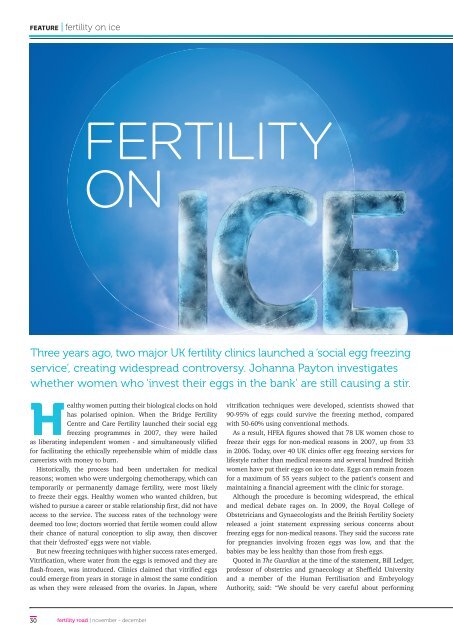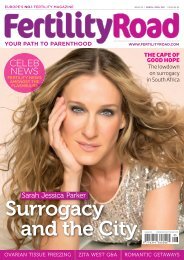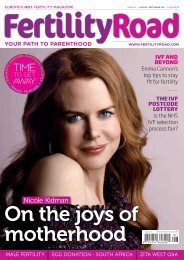Fertility Road Issue 03
Create successful ePaper yourself
Turn your PDF publications into a flip-book with our unique Google optimized e-Paper software.
FEATURE | fertility on ice<br />
FERTILITY<br />
ON<br />
Three years ago, two major UK fertility clinics launched a ‘social egg freezing<br />
service’, creating widespread controversy. Johanna Payton investigates<br />
whether women who ‘invest their eggs in the bank’ are still causing a stir.<br />
Healthy women putting their biological clocks on hold<br />
has polarised opinion. When the Bridge <strong>Fertility</strong><br />
Centre and Care <strong>Fertility</strong> launched their social egg<br />
freezing programmes in 2007, they were hailed<br />
as liberating independent women - and simultaneously vilified<br />
for facilitating the ethically reprehensible whim of middle class<br />
careerists with money to burn.<br />
Historically, the process had been undertaken for medical<br />
reasons; women who were undergoing chemotherapy, which can<br />
temporarily or permanently damage fertility, were most likely<br />
to freeze their eggs. Healthy women who wanted children, but<br />
wished to pursue a career or stable relationship first, did not have<br />
access to the service. The success rates of the technology were<br />
deemed too low; doctors worried that fertile women could allow<br />
their chance of natural conception to slip away, then discover<br />
that their ‘defrosted’ eggs were not viable.<br />
But new freezing techniques with higher success rates emerged.<br />
Vitrification, where water from the eggs is removed and they are<br />
flash-frozen, was introduced. Clinics claimed that vitrified eggs<br />
could emerge from years in storage in almost the same condition<br />
as when they were released from the ovaries. In Japan, where<br />
vitrification techniques were developed, scientists showed that<br />
90-95% of eggs could survive the freezing method, compared<br />
with 50-60% using conventional methods.<br />
As a result, HFEA figures showed that 78 UK women chose to<br />
freeze their eggs for non-medical reasons in 2007, up from 33<br />
in 2006. Today, over 40 UK clinics offer egg freezing services for<br />
lifestyle rather than medical reasons and several hundred British<br />
women have put their eggs on ice to date. Eggs can remain frozen<br />
for a maximum of 55 years subject to the patient’s consent and<br />
maintaining a financial agreement with the clinic for storage.<br />
Although the procedure is becoming widespread, the ethical<br />
and medical debate rages on. In 2009, the Royal College of<br />
Obstetricians and Gynaecologists and the British <strong>Fertility</strong> Society<br />
released a joint statement expressing serious concerns about<br />
freezing eggs for non-medical reasons. They said the success rate<br />
for pregnancies involving frozen eggs was low, and that the<br />
babies may be less healthy than those from fresh eggs.<br />
Quoted in The Guardian at the time of the statement, Bill Ledger,<br />
professor of obstetrics and gynaecology at Sheffield University<br />
and a member of the Human Fertilisation and Embryology<br />
Authority, said: “We should be very careful about performing<br />
30 fertility road | november - december
















